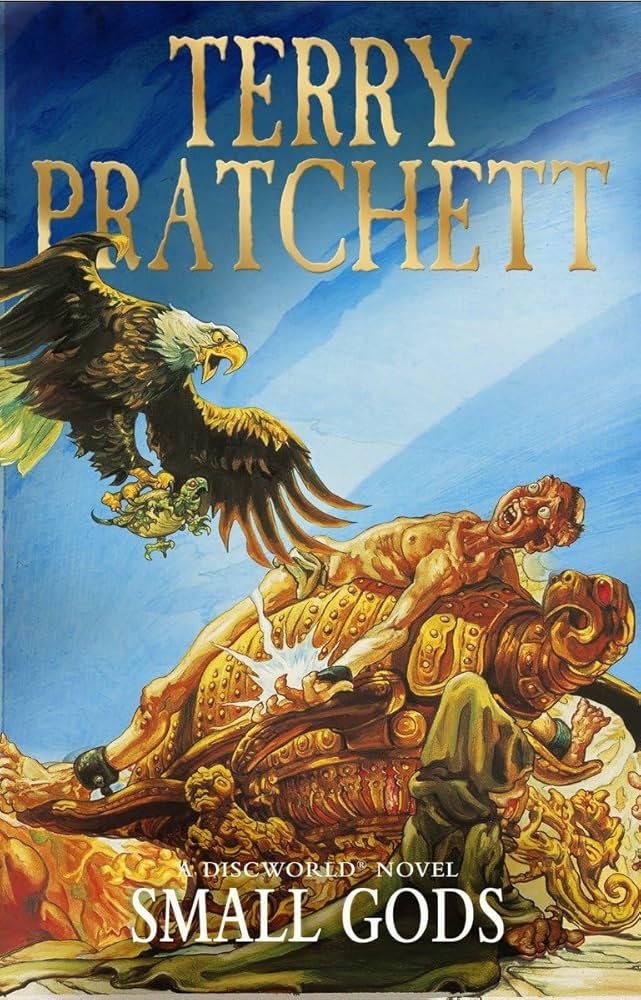
This is part of the Pratchett Project.
The blurb:
Religion is a controversial business in the Discworld. Everyone has their own opinion, and indeed their own gods. Who comes in all shapes and sizes. In such a competitive environment, there is a pressing need to make one's presence felt. And it's certainly not remotely helpful to be reduced to be appearing in the form of a tortoise, a manifestation far below god-like status in anyone's book. In such instances, you need an acolyte, and fast. Preferably one who won't ask too many questions.
The competition for 'my favourite Discworld novel' is fierce. So far, Nightwatch is a whisker ahead of Thud!, with Monstrous Regiment coming in a very close third.
Small Gods is now somewhere up there as well, I think.
It's the 13th Discworld novel, published in 1992. In Discworld chronology, it's set about a hundred years before Guards! Guards!, Moving Pictures and Reaper Man, according to the L Space wiki's timeline. There's quite a difference between the Omnian religion at the start of Small Gods and what I remember of it from later books, with characters like Constable Visit. In the latter books, Omnianism takes a condescendingly frowny approach to other religions, describing them as misguides; its adherents believe that explanatory pamphlets will convert the unbelievers.
At the start of Small Gods, by contrast, Omnianism favours the 'fire and sword' approach. It's led by the Quisition, which in turn is led by Vorbis. If you want to know what sort of character Vorbis is...well, Spanish Inquisition is kind of the flavour Pratchett was going for. He's like Vetinari in some ways: calculating, intelligent, determined to have things his way...but without Vetinari's moral centre. Vorbis is a fanatic, that's all; he's convinced that the rest of the world must be converted to Omnianism by any means necessary, up to and including killing them all and letting God sort them out.
The trouble is, God—Om—is currently a small tortoise. He tried to manifest as a white bull, one of his past forms, didn't quite have the belief-juice to do it and ended up as a tortoise instead. Om has discovered that, far from being a powerful deity, he now only has one true believer left in the world, a rather simple-minded novice named Brutha. Everyone else's belief has slipped; they think they're still worshipping Om but they're actually focused entirely on rules and rituals instead of the actual god.
Brutha, who has a perfect memory, is caught up in Vorbis's scheme to 'convert' (i.e. conquer) Ephebe. Along the way, rebellions are fomented—including the big one against Om and its conquering ways. Brutha is not one of the world's cleverest people, exactly, and he's extremely naive—the concept that people in other places believe in things other than Om is completely new to him, and he's rather amazed by the concept of 'philosophy'—so the novel covers a lot of him finding out about the world, and about Omnianism not being universally loved, let's say. By the end, Brutha and Om have come to a deal about how Om responds to believers, of which he will gain more. Brutha becomes a prophet, and Omnianism becomes less about the sword and more about the pamphlet.
The whole book is Pratchett taking aim at the way organised religion twists any positive benefit that mght come out of personal belief. I don't believe he's saying that religion is inherently bad—Brutha is religious, and he's not held out as a bad person—but it's certainly corruptible, and prone to becoming about the ritual and benefit to leaders of it. And that's the bit that Pratchett's mocking—the tendency to follow the rules, or bend them until they say something you want and then follow them (there are quite a few books by prophets that Om doesn't recognise, for instance). Quiet, personal belief that involves self-reflection and genuinely trying to make the world a better place is one thing; blindly following a set of unexamined rules is another; and using a religion to actively make the world a worse place for your followers is yet another.
It's a biting, incisive satire with fully drawn characters. The storyline is busy and excellently plotted, always moving forwards. I really enjoyed reading this; I'd rate it as one of Pratchett's best, as far as I'm concerned.
Started: 18 August 2025
Finished: 24 August 2025
Back home.
More books.
More from the Pratchett Project.